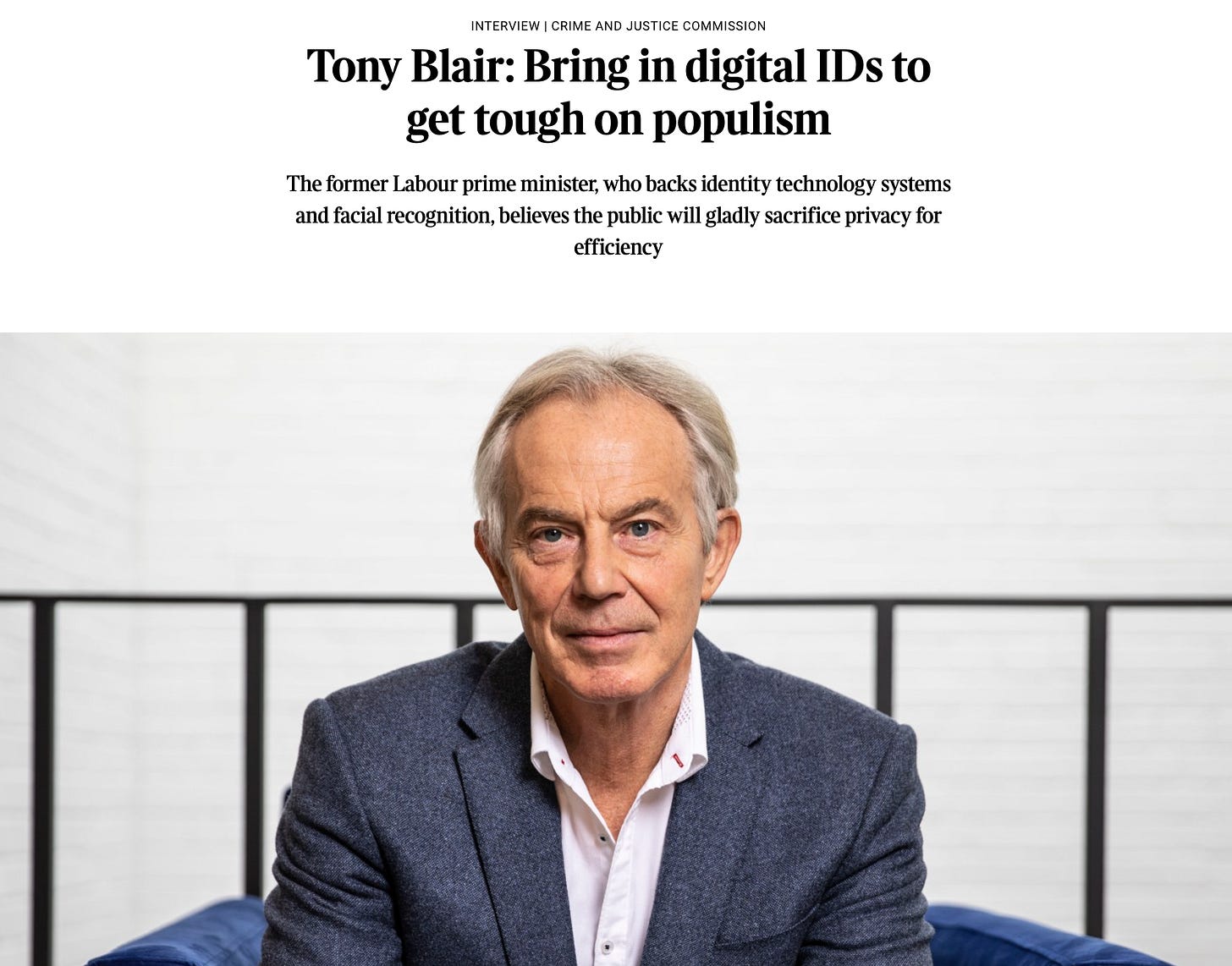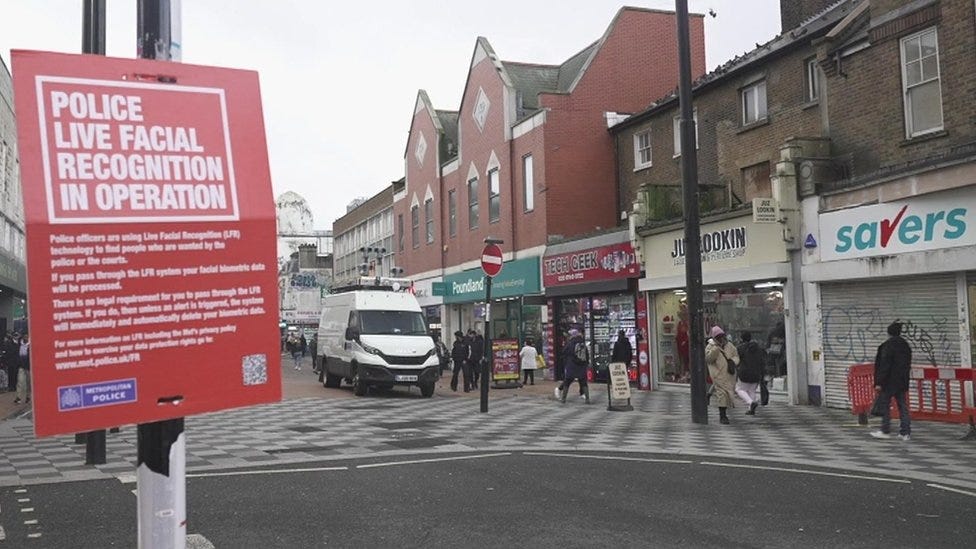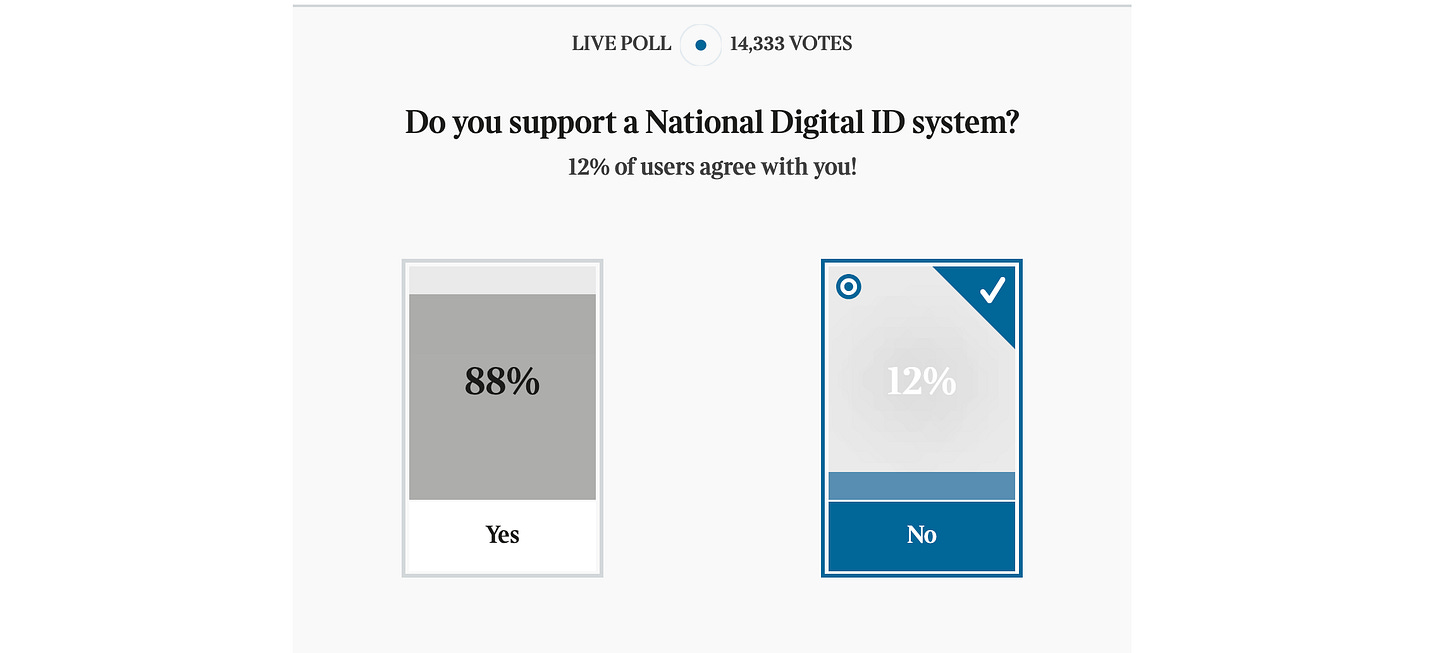The globalist plan for a digital control grid
The UK appears to be sleepwalking into a digital surveillance state — willingly! Someone put a muzzle on Tony Blair and wake up Brits before it’s too late.
Tony Blair — the man who helped drag Britain into disastrous foreign wars and who was once named ‘worst Briton’ — is working hard to reinvent his image as a surveillance tech guru. In a recent interview with The Times, he expounded on his latest obsession: turning the UK into a digital gulag.
Blair is pushing Prime Minister Keir Starmer to move fast on a national digital ID system, live facial recognition cameras, AI-powered law enforcement, and an entire government infrastructure built on tracking and monitoring citizens. He says it’s to combat illegal immigration, reduce fraud, and fight crime. But if history tells us anything, it’s that when the state expands its power under the guise of security, it never relinquishes it.
Blair isn’t just concerned about immigration or crime. His real target appears to be people who disagree with the political establishment. He explicitly says that digital IDs and AI-driven governance will help push back against so-called “populists” like Nigel Farage and Reform UK. In other words, he wants to use technology to control political opposition.
Digital IDs would make stopping dissent so much easier! Just like vaccine passports, online censorship, and bank account freezes for political protesters.
Facial recognition: The next step to total surveillance
Blair doesn’t want Starmer to stop at digital IDs, either. The Times reports: “He wants live facial recognition technology — which has been piloted in London and Wales — to be brought in around the country” as soon as possible.
“I don’t know why we have to keep on trialing all this stuff forever. Just get it introduced,” says Blair. “Everywhere it is trialled it has a dramatic impact on crime. It allows you to trace people. We should be accelerating all of this.”
But look at how China uses this technology — there, it’s not so much about catching criminals as it is about monitoring, controlling, and categorizing citizens. So if you think facial recognition will only target criminals, think again. Once facial recognition is integrated with digital IDs, it becomes a real-time social control tool. Police can instantly identify, track, and punish anyone they deem a threat to the regime’s power.
Quite frankly, as a panelist at Davos recently said, digital IDs pretty much become a moot point once facial recognition is rolled out everywhere.
Proponents of digital IDs like Blair have laughable arguments: “You already give more personal information to Netflix and online shopping services,” they say. Maybe… but the difference is Netflix can’t freeze my bank account, block my ability to travel or go to work, or restrict my access to public services.
Here’s what your digital future might look like:
Your ID is tied to your bank account: Yes, convenient, except you can never make an anonymous purchase again.
Your ID gives you access to public services: No need to recite your date of birth or social security number anymore! But good luck accessing your pension if you refused the latest government-mandated medical procedure.
Your ID lets you buy a plane ticket: Oh, you already flew last month, too? Sorry, you can’t go again this month. And your husband was observed jaywalking so he’ll never travel again.
Your ID is your digital currency: No more credit cards. No more dollar bills. Spend what the government allows you to, when it allows you to.
This isn’t speculation — it’s already happening, to some extent, in countries like China, Nigeria, and India, where digital IDs are used to control access to money, services, and basic freedoms.
The real endgame: “smaller” governments with more power
“You’ve got to reorder the government around this technology revolution,” Blair says.
“You should be able to have a state that is smaller, more strategic and providing greater efficiency at lower cost.”
What does that really mean? More power centralized in fewer hands, with AI and digital IDs enforcing compliance. In other words, the government as data collection agency with a handful of technocrats analyzing the data to make ‘rational’ decisions in the name of public interest.
Blair is selling his approach as “empowering individuals,” and it seems like he won’t get much pushback either – in polls, a majority of Brits of all political persuasions seem to favor digital IDs. The British public, having long accepted things like the NHS number and biometric passports, seems generally more open to the idea.
In December 2024, a UK poll by public opinion firm More in Common found that 53% of Brits are in favor of a universal digital identification system, with 25% strongly in favor, and only 19% against it.
Luke Tryl, executive director of More in Common, said:
“For lots of people digital ID cards just seem like common sense, they’d make life easier for them and make it easier to tackle illegal behaviour and catch criminals. That combination of ease and greater safety far outweighs any concerns about privacy. In fact, the truth is that Brits are consistently more authoritarian on questions of civil liberties than most politicians realise.”
Tony Blair agrees, saying the public is “prepared to trade quite a lot” of privacy for efficiency. But that’s a false trade-off. The more control we hand over to the government under the promise of convenience, the harder it will be to resist when it inevitably turns against us.
Globalists want you to believe that digital IDs and facial recognition are inevitable — that resistance is futile and we must simply accept the march toward a fully monitored society. But history tells a different story. Mass surveillance only succeeds when people comply.
The UK may be sleepwalking into a digital gulag, but the fight is far from over. Civil liberties groups, privacy advocates, and ordinary citizens who value freedom still have time to push back. Governments only expand their power when the people let them. Resistance is not just possible — it’s necessary.
In the US, digital IDs remain highly controversial. Americans have a long tradition of skepticism toward government overreach, and many refuse to accept a future where every transaction, movement, and political opinion is tracked. This isn’t a left vs. right issue — it’s a fundamental question of whether we control technology, or whether technology controls us.
The battle is not yet lost, but the window is closing. The more people wake up to the dangers of digital IDs, the harder it becomes for governments to implement them. Mass noncompliance, public resistance, and alternative systems for identity and transactions can still keep the surveillance state at bay.
Technology can serve freedom just as easily as it can serve control. The future doesn’t have to be a digital dystopia — but only if we make it clear that we won’t trade our rights for convenience.






Back in the 60s I received my Social Security card in the mail. It was clearly labeled "Not to be used for identification purposes." In the ensuing 60+ years I have had to offer up that number myriad times, ranging from opening a bank account to getting a library card. In a very real sense that number *is* my digital ID. The only thing missing in the countless database records where it resides is my photo. My ID sits patiently in a server, waiting to be stolen by a hacker. Not only could my meager income be instantly cut off using that number, so could my access to my banks and credit cards. The UK is awash in cameras. In British television shows, the first question asked at every crime scene is "Do we have CCTV?" We're only a few years behind in camera proliferation, using cheap cameras made in China. They are connected to the Internet, but the Chinese makers promise not to be sending any of the captured data back to China, using software built into the camera (with fingers firmly crossed).
The UK is in a very weird place at the moment. And Blair? Why is he even in the picture. We need a dose of Doge here to uncover what, in this dystopian facial recognition push, is in it for him.